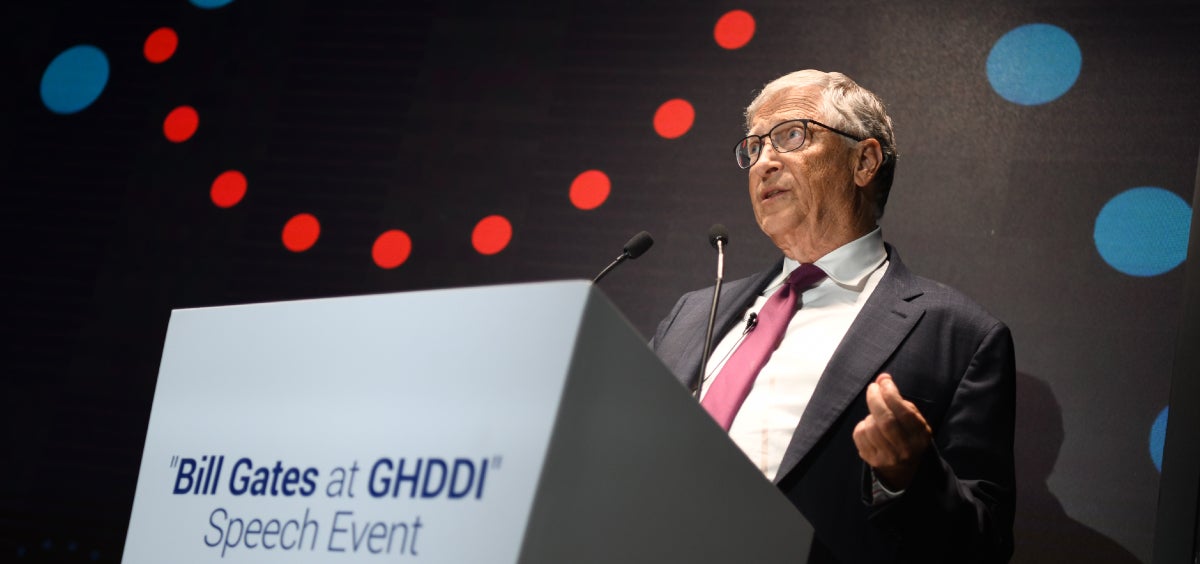風蕭蕭_Frank
以文會友離開四年後我要訪問這個國家
https://www.gatesnotes.com/Visiting-中國
我親眼目睹了一些可能有助於全球進步的創新。
比爾·蓋茨 2023 年 6 月 16 日
我想分享我在中國的一些印象。 我剛剛與習主席會麵,我們討論了應對全球健康和發展挑戰(例如健康不公平和氣候變化)的重要性,以及中國如何在實現世界人民進步方麵發揮作用。
作為我在蓋茨基金會工作的一部分,我試圖每年訪問中國、印度、非洲和歐洲的國家以及華盛頓特區。 在這些旅行中,我會與研究人員、政府領導人、倡導者和其他致力於健康和發展不平等問題的專家交談。 我總是能學到很多東西,從我的所見所聞中得到啟發。
能夠恢複這些定期訪問真是太好了。 這是我四年來第一次去中國,這次旅行之後,我五年來第一次去西非。 我三月份去了印度。
在今年的每次旅行中,我都傳達了一個關鍵信息:在過去的二十年裏,世界在減少貧困和改善健康成果方麵取得了重大進展,但 COVID 是一個巨大的挫折,甚至逆轉了一些全球目標的進展,如減少貧困和抗擊戰爭 結核病和瘧疾。 例如,許多非洲國家特別受到重疊挑戰的影響,包括氣候變化的影響、高糧價、貧困率上升、傳染病激增和巨大的債務壓力。
盡管許多非洲國家麵臨的挑戰很複雜,但我樂觀地認為,衛生、農業、數字金融和能源領域的創新將有助於改善那裏的生活。 我期待著在訪問西非時會見領導人和年輕人,以幫助加快進展。
解決這些問題需要創新——新工具和新做事方式。 中國在其境內消除了脊髓灰質炎和瘧疾等疾病,開發出青蒿素等藥物,使全世界數百萬人免於瘧疾,中國在減貧方麵取得了長足進步,並在清潔能源和氣候適應方麵進行了大量投資。 所以我很期待看到自四年前我上次訪問以來發生了什麽變化。
一個亮點是我參觀了全球健康藥物發現研究所,這是我們基金會六年前與北京市政府和清華大學合作建立的一個組織。 GHDDI 代表了公共和私人合作夥伴共同努力發現新藥的有效方式,這些新藥對世界上最脆弱的人群產生了不成比例的影響,但在世界範圍內都有應用。 我昨天談到了該研究所在結核病和瘧疾方麵的工作,我們還將我們的合作夥伴關係擴展到未來五年。
我還參觀了中國國家作物基因庫。 該設施是著名的作物研究中心,也是種子的長期保存儲存空間,使世界各地的科學家都能獲得重要的遺傳數據。 在訪問期間,我會見了農業科學家,他們正在與世界各地的同行合作,特別是在非洲,研究新的水稻品種,以幫助農民提高生產力並最大限度地減少對化肥、殺蟲劑和灌溉的需求。
他們的工作成果惠及亞洲和非洲的數百萬農戶。 農業部門對技術和創新的持續投資對提高整個中國的農業生產力發揮了重要作用。 更讓我興奮的是中國致力於與低收入國家分享他們的專業知識和創新實踐。 通過幫助農民適應氣候變化、增加收入和應對糧食危機,他們正在為全球糧食安全做出重大貢獻。
基因庫和 GHDDI 隻是基金會在中國合作超過 15 年以來在中國看到的有前途工作的兩個例子。 今年晚些時候,中國和其他國家將有更多機會站出來,包括在巴黎舉行的發展融資峰會、在新德裏舉行的 G20 會議以及在迪拜舉行的 COP28 氣候大會。
我相信,如果全世界共同努力應對氣候變化、健康不平等和糧食安全問題,我們就能取得非凡進展。 我期待著探索合作和創新的新機會,這將為每個人創造更美好的未來。
I'm visiting the country after four years away
https://www.gatesnotes.com/Visiting-China
I'm seeing first-hand some of the innovations that could contribute to global progress.
By Bill Gates June 16, 2023

I want to share a few impressions from my time in China. I just had a meeting with President Xi, in which we discussed the importance of addressing global health and development challenges, like health inequity and climate change, and how China can play a role in achieving progress for people everywhere.
As part of my work with the Gates Foundation, I’ve tried to visit China, India, countries in Africa and Europe, and Washington D.C. each year. On these trips, I’d talk to researchers, government leaders, advocates, and other experts who are working on inequities in health and development. I’d always learn a lot, returning inspired by what I saw and heard.
It’s great to be able to resume these regular visits. This was my first trip to China in four years, and immediately after this trip, I’m headed to West Africa for the first time in five years. And I went to India in March.
On each trip this year, I have a key message: Over the past two decades, the world made significant strides in reducing poverty and improving health outcomes, but COVID was a big setback and even reversed progress on some global goals like reducing poverty and fighting TB and malaria. Many African countries, for example, are particularly impacted by overlapping challenges, including the effects of climate change, high food prices, escalating poverty rates, surging infectious diseases, and significant debt pressures.
Even though the challenges facing many African countries are complex, I’m optimistic that innovation in health, agriculture, digital finance, and energy will help improve lives there. I’m looking forward to meeting leaders and young people helping to accelerate progress when I visit West Africa.
Solving these problems requires innovation—both new tools and new ways of doing things. China has eliminated diseases, including polio and malaria, within its borders, developed drugs like artemisinin that have saved millions of lives around the world from malaria, made great strides in poverty reduction, and has made significant investments in clean energy and climate adaptation. So I was looking forward to seeing what’s changed since my last visit four years ago.
One highlight was my visit to the Global Health Drug Discovery Institute, an organization our foundation helped establish six years ago in partnership with the Beijing Municipal Government and Tsinghua University. GHDDI represents a productive way for public and private partners to work together on discovering new medicines for diseases that disproportionately impact the world’s most vulnerable populations but have applications for the world. I spoke about the institute’s work on TB and malaria yesterday, and we also extended our partnership over the next five years.
I also got to visit the National Crop Genebank of China. This facility is a prominent crop research center and also serves as a long-term preservation storage space for seeds so that scientists around the world have access to important genetic data. During my visit, I met with agricultural scientists who are working with their counterparts worldwide, particularly in Africa, on new rice varieties that help farmers increase their productivity and minimize the need for fertilizers, pesticides, and irrigation.
The benefits of their work have reached millions of farming households across Asia and Africa. The continued investment in technology and innovation within the agricultural sector has played a significant role in the increase in agricultural productivity throughout China. What excites me even more is China’s commitment to share their expertise and innovative practices with low-income countries. By assisting farmers in adapting to climate change, increasing their income, and combating food crises, they are making a substantial contribution to global food security.
The genebank and GHDDI are just two examples of the promising work the foundation has seen in China in the more than 15 years we’ve been partnering here. And there will be more opportunities for China and others to step up later this year, including a summit on development financing in Paris, a meeting of the G20 in New Delhi, and the COP28 climate conference in Dubai.
I'm convinced that if the world works together to address climate change, health inequity, and food security we can make extraordinary progress. And I’m looking forward to exploring new opportunities for collaboration and innovation that will make a better future for everyone.




